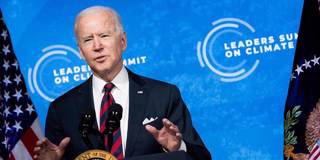The objectives of US President Joe Biden’s climate and democracy summits exemplify sharply different aspects of multilateral cooperation. But Biden’s are not contradictory: the first meeting sought to enhance the provision of a crucial global public good, while the second aims to promote values deemed universal.
WASHINGTON, DC – In April, US President Joe Biden gathered 40 world leaders for a virtual summit on tackling the climate crisis. They included representatives of major emitting countries, such as Russian President Vladimir Putin and Chinese President Xi Jinping, as well as heads of states that are particularly vulnerable to the effects of climate change. Civil-society and business leaders also took part. Biden and many other attendees announced more ambitious climate policies ahead of the United Nations climate change summit (COP26) in November.
On December 9-10, Biden will fulfill a pre-election promise by hosting another virtual gathering, dubbed a Summit for Democracy. Although details have yet to be released, the meeting will focus on “defending against authoritarianism, fighting corruption, and promoting respect for human rights.” Biden will again invite leaders from government, civil society, and the private sector.
But the objectives of the two summits exemplify sharply different aspects of multilateral cooperation. Reducing greenhouse-gas emissions to combat climate change is the archetypal global public good (GPG), resulting in benefits that are both nonrival and nonexcludable. Their accrual to one country does not diminish the benefit to others, and no one can be excluded from them once they are provided.

WASHINGTON, DC – In April, US President Joe Biden gathered 40 world leaders for a virtual summit on tackling the climate crisis. They included representatives of major emitting countries, such as Russian President Vladimir Putin and Chinese President Xi Jinping, as well as heads of states that are particularly vulnerable to the effects of climate change. Civil-society and business leaders also took part. Biden and many other attendees announced more ambitious climate policies ahead of the United Nations climate change summit (COP26) in November.
On December 9-10, Biden will fulfill a pre-election promise by hosting another virtual gathering, dubbed a Summit for Democracy. Although details have yet to be released, the meeting will focus on “defending against authoritarianism, fighting corruption, and promoting respect for human rights.” Biden will again invite leaders from government, civil society, and the private sector.
But the objectives of the two summits exemplify sharply different aspects of multilateral cooperation. Reducing greenhouse-gas emissions to combat climate change is the archetypal global public good (GPG), resulting in benefits that are both nonrival and nonexcludable. Their accrual to one country does not diminish the benefit to others, and no one can be excluded from them once they are provided.